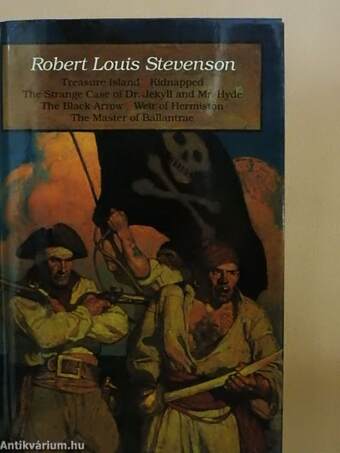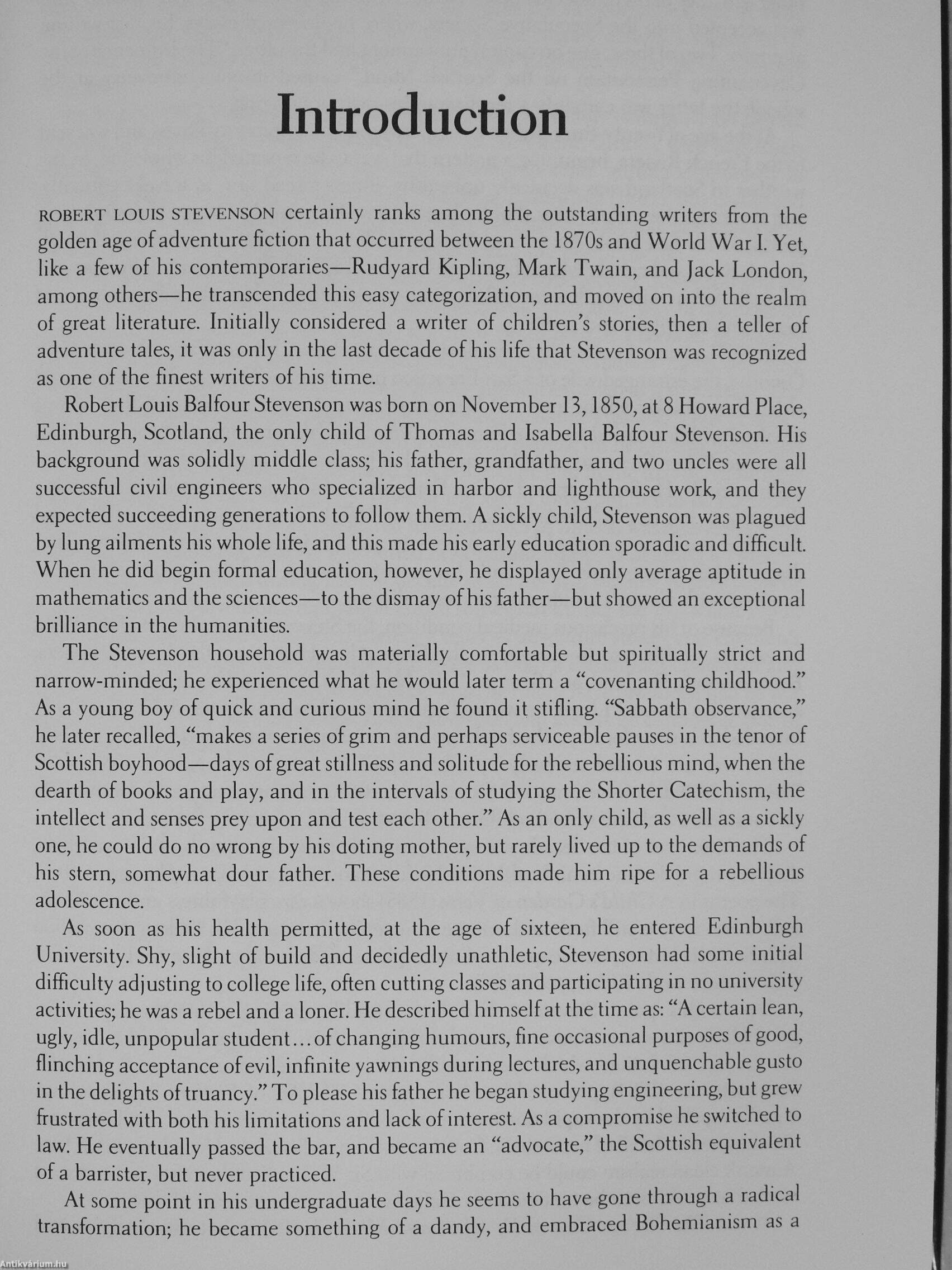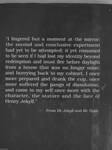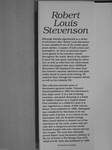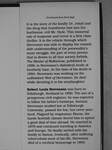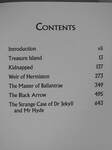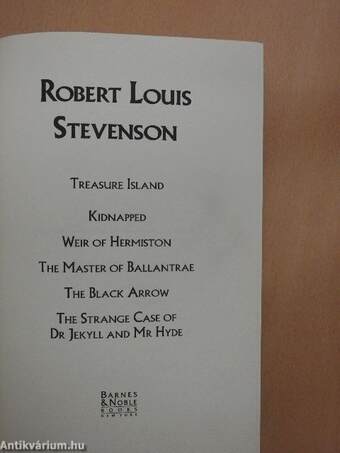1.067.339
kiadvánnyal nyújtjuk Magyarország legnagyobb antikvár könyv-kínálatát

VISSZA
A TETEJÉRE
JAVASLATOKÉszre-
vételek
Treasure Island/Kidnapped/Weir of Hermiston/The Master of Ballantrae/The Black Arrow/The Strange Case of Dr. Jekyll and Mr Hyde
| Kiadó: | Barnes & Noble Books |
|---|---|
| Kiadás helye: | New York |
| Kiadás éve: | |
| Kötés típusa: | Fűzött keménykötés |
| Oldalszám: | 687 oldal |
| Sorozatcím: | |
| Kötetszám: | |
| Nyelv: | Angol |
| Méret: | 24 cm x 16 cm |
| ISBN: | 0-88029-762-X |
| Megjegyzés: | Hat mű egy kötetben. |
naponta értesítjük a beérkező friss
kiadványokról
naponta értesítjük a beérkező friss
kiadványokról
Előszó
TovábbFülszöveg
"I lingered but a moment at the mirror: the second and conclusive experiment had yet to be attempted; it yet remained to be seen if I had lost my identity beyond redemption and must flee before daylight from a house that was no longer mine; and hunying back to my cabinet, I once more prepared and drank the cup, once more suffered the pangs of dissolution, and came to my self once more with the character, the stature and the face of Henrv Jekvll."
From Dr. Jekijll and Mr. Hyde
Robert Louis Stevenson
Although initially pigeonholed as a writer of adventure tales, Robert Louis Stevenson is now considered one of the world's great prose stylists. A master of both action and atmosphere, he drew on personal experiences gained in his extensive travels throughout the world. Much of his relatively short life was spent searching for adventure as well as relief from the tuberculosis which had plagued him since childhood. Stevenson's life displayed the same dualism between romantic adventure... Tovább
Fülszöveg
"I lingered but a moment at the mirror: the second and conclusive experiment had yet to be attempted; it yet remained to be seen if I had lost my identity beyond redemption and must flee before daylight from a house that was no longer mine; and hunying back to my cabinet, I once more prepared and drank the cup, once more suffered the pangs of dissolution, and came to my self once more with the character, the stature and the face of Henrv Jekvll."
From Dr. Jekijll and Mr. Hyde
Robert Louis Stevenson
Although initially pigeonholed as a writer of adventure tales, Robert Louis Stevenson is now considered one of the world's great prose stylists. A master of both action and atmosphere, he drew on personal experiences gained in his extensive travels throughout the world. Much of his relatively short life was spent searching for adventure as well as relief from the tuberculosis which had plagued him since childhood. Stevenson's life displayed the same dualism between romantic adventure and grim reality found in much of his writing. He achieved fame through his romantic fiction as well as his romantic life.
This collection includes some of Stevenson's greatest works. Treasure Island published in 1883 was Stevenson's first major novel. It is a tale of daring, treachery, and greed climaxing in a battle for hidden treasure on a tropical island. First intended as a children's story it is now regEirded as a classic of 19th centuiy fiction. First published in 1886, Kidnapped wg^s considered by Stevenson to be his finest work of fiction. It is a tribute to his fascination with his Scottish heritage. When David Balfour is cheated out of his inheritance by his uncle, justice only prevails ELfter a dangerous journey across Scotland fraught with near-misses and narrow escapes. The work that ultimately proved Robert Louis Stevenson's mastery of the art of fiction is The Strange Case of Dr. Jekyll and Mr. Hyde also published in 1886.
(Continued on backjlap)
(Continued from front flap)
It is the story of the kindly Dr. Jekyll and the drug that transforms him into the loathsome, evil Mr. Hyde. This immortal tale of suspense and terror is a first class thriller. It is the vehicle through which Stevenson was able to display his remarkable understanding of the personality's inner struggle, the part of every person that is drawn to all that society forbids. The Master of Ballantrae, published in 1889, is Stevenson's diabolical study of brotherly hate. At the time of his death in 1894, Stevenson was working on the unfinished Weir of Hermiston. He died while dictating it to his stepdaughter.
Robert Louis Stevenson was born in Edinburgh, Scotland in 1850. The son of a prosperous civil engineer, he was expected to follow his father's footsteps. Instead, Stevenson studied law at Edinburgh University, passed the bar, but never practiced. Plagued by respiratory illness, the harsh Scottish climate forced him to spend a good deal of time abroad. He married in 1879 and continued traveling in America and Europe. He finally settled with his family in Samoa. Ironically, afi;er suffering tuberculosis most of his life, Stevenson died of a cerebral hemorrage in 1894. Vissza
Témakörök
- Idegennyelv > Idegennyelvű könyvek > Angol > Szépirodalom > Gyermek- és ifjúsági irodalom > Regények
- Idegennyelv > Idegennyelvű könyvek > Angol > Szépirodalom > Regény, novella, elbeszélés
- Idegennyelv > Idegennyelvű könyvek > Angol > Szépirodalom > Szórakoztató irodalom > Akció, kaland
- Szépirodalom > Regény, novella, elbeszélés > Az író származása szerint > Európa > Nagy-Britannia
- Szépirodalom > Regény, novella, elbeszélés > Tartalom szerint > Történelmi regények > Középkor > Háborúk > Rózsák háborúja
- Szépirodalom > Regény, novella, elbeszélés > Tartalom szerint > Családregények
- Szépirodalom > Regény, novella, elbeszélés > Tartalom szerint > Kalandregények
- Szépirodalom > Regény, novella, elbeszélés > Tartalom szerint > Romantikus regények
- Szépirodalom > Regény, novella, elbeszélés > Tartalom szerint > Kísértet- és rémtörténetek
- Szépirodalom > Gyermek- és ifjúsági irodalom > Regények, elbeszélések > Tartalom szerint > Hajózás, repülés
- Szépirodalom > Gyermek- és ifjúsági irodalom > Regények, elbeszélések > Tartalom szerint > Romantikus, szerelmes
- Szépirodalom > Gyermek- és ifjúsági irodalom > Regények, elbeszélések > Tartalom szerint > Kalandregények
- Szépirodalom > Gyermek- és ifjúsági irodalom > Regények, elbeszélések > Idegennyelvű > Angol
- Szépirodalom > Gyermek- és ifjúsági irodalom > Regények, elbeszélések > Tartalom szerint > Történelmi regények > Középkor > Háborúk > Rózsák háborúja
- Szépirodalom > Gyermek- és ifjúsági irodalom > Regények, elbeszélések > Az író származása szerint > Európa > Nagy-Britannia
- Szépirodalom > Regény, novella, elbeszélés > Tartalom szerint > Filmregények
- Szépirodalom > Szórakoztató irodalom > Akció, kaland



